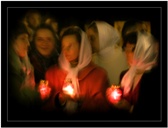|
From 'Orthodoxy and the World' www.pravmir.com Feasts. Calendar
As Jesus was going to Jerusalem, He visited the house of Simon the leper. A woman came and poured precious myrrh on the head of Christ and wiped His feet with her hair, serving Him at great cost to herself. This event is described because, according to the Christ's word, her act of great fervor shall be proclaimed to everyone everywhere. What moved her to do this? She had seen how merciful Christ was and how accessible to all; now, in particular, she saw Him enter the house of a leper, whom the Law deemed unclean and unfit for society. She thought to herself that He would heal the man's leprosy and likewise the illness of her own soul. Thus, while He was seated, she poured on top of His head myrrh, which was worth about "three hundred thirteen denarii in silver coin," that is, sixty assaria, and she wiped His feet with her hair." She placed her head at His feet, showing her zeal for repentance, but the disciples scolded her, particularly Judas Iscariot. Christ, however, welcomed her, not allowing them to scare her away. We should know that today the deceitful Judas, that lover of money, Satan's child, began the negotiations with the wicked Sanhedrin to betray the Lord for thirty pieces of silver. Being indignant after Christ rebuked him for showing concern for the cost of myrrh, he sought out the Jews who were at the court of Caiaphas. After taking council with the Jewish High Priests, he searched for an opportunity to betray the Lord when He was alone, for the Sanhedrin feared the multitude that followed Christ. We see in today's Gospel (Matt. 26:6-16) that the sinful woman brought myrrh to anoint Christ, while Judas brought his greed to the Sanhedrin. She spread out her hair to wipe the Lord's feet, while Judas stretched out his hands for the money. She rejoiced to pour out the very precious oil on the Lord, while Judas made plans to sell the One who is above all price. By anointing Christ, she acknowledged Him as Lord, while Judas severed himself from the Master. She was set free of her sins, while Judas was entrapped and became a slave of the devil. She tenderly kissed the feet of Christ, asking for forgiveness, while Judas plotted to betray the Lord with a kiss, anticipating the silver. Because the betrayal of Christ occurred on a Wednesday, the Orthodox Church has received the tradition from Apostolic times to observe Wednesday as a fast day throughout the entire year. O Christ our God, Who was anointed with the noetic myrrh, have mercy on us and save us. Amen. Troparion of the Bridegroom Behold! The bridegroom approaches in the middle of the night, And blessed is that servant whom He shall find watching; But unworthy he whom He shall find careless. Beware, therefore, O my soul. Be not overcome with sleep, lest thou be given over to death and shut outside the kingdom. But arise and cry: Holy, holy, holy art Thou, O God! Through the Theotokos have mercy on us! Kontakion, Tone 4 Though I have transgressed, O Good One, more than the harlot, I have never offered Thee a flood of tears. but, praying in silence, I fall down before Thee, with love embracing Thy most pure feet, that Thou as Master mayest grant me remission of sins. And I cry to Thee, O Saviour: Deliver me from the defilement of my evil deeds. Ikos: Having come to hate the works of sin and carnal pleasure, the woman who before had been a prodigal became chaste at once. Calling to mind the magnitude of disgrace and the condemnation of torment which harlots and profligates, of whom I am first, shall endure, I also am afraid; yet I foolishly continue in my evil ways. But the woman who was a harlot, having been filled with fear, hastened quickly to the Deliverer, crying out: "O compassionate Lord who lovest mankind, deliver me from the defilement of my evil deeds."
THE LITURGY of the Presanctified Gifts is celebrated on this day for the last time during Lent. This very ancient Liturgy is a Vesper Service, with the Holy Gifts presanctified in the Liturgy on the previous Sunday. This Liturgy is offered every Wednesday and Friday during Lent so that the people may receive Holy Communion. This Liturgy is solemn, and reflects the grandeur and simplicity of the early Church. During Lent no other Liturgy is held except on Saturday, Sunday and March 25, when the Liturgies of St. Basil (on Sundays) and St. Chrysostom are officiated. THE SACRED CEREMONY of the Mysterion of the Holy Unction takes place on this Wednesday evening, following an old custom. It is the evening of repentance, confession and the remission of sins by the Lord, preparing the faithful to receive Holy Communion, usually the next day, Holy Thursday morning. Holy Unction is the Mysterion for cleansing sins and renewing the body and the spirit of the faithful. Holy Unction is one of the seven Sacraments of the Church, and it has its origin in the practice of the early Church as recorded in the Epistle of James (5:14-15). At the end of the service, the priest anoints the people with Holy Oil, the visible carrier of the Grace of God. © Copyright 2004 by 'Orthodoxy and the World' www.pravmir.com |
